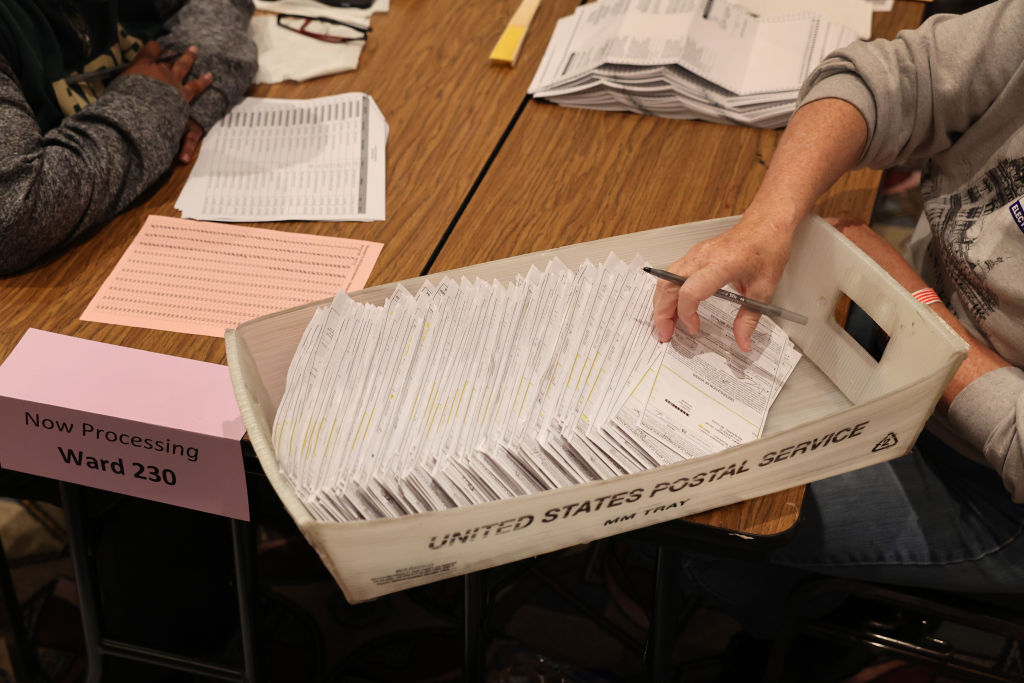“Ballot harvesting.” To some, it’s a creepy term, conjuring images of hulking party machines plowing through passive fields of citizens, threshing their votes and delivering them to the ballot box. To others, the whole thing seems practically a conspiracy theory — a catch-all for sore losers who can’t understand how voters could have rejected their team.
Feelings aside, ballot harvesting is a reality for much of the country. In twenty-seven states, your ballot can be returned by someone other than you. Further, only twelve of those twenty-seven have any limit at all on the number of ballots a person can turn in, meaning an eager harvester can show up with dozens or hundreds of ballots.
In another thirteen states, the whole shebang is ignored, with neither laws in favor nor against the practice. In fact, the only state that mandates you return your own ballot (either in person or through the US Post Office) is Alabama.
While Republicans scrambled to decide whether to blame Donald Trump, Mitch McConnell, Kevin McCarthy or the Ghost of Christmas Platforms for their midterms performance, one simple reality stands out from all the gripes, feuds and narratives: the Democratic Party played an entirely different ballgame from the GOP.
While absentee voting’s advocates champion the practice as a tool to extend easy access to the elderly, disabled and poor, the practice hasn’t caught on with the right. In many red parts of America, the very concept is treated with open suspicion and contempt. As a result, few state Republican machines have much of an absentee voting operation at all. That contempt, however, still found a target even without Republicans engaging in the practice: the national elections themselves.
When long counts of absentee ballots in election after election seem to go Democrats’ way with scant exceptions, even those GOP voters resistant to internet conspiracy theories begin to lose faith in the democratic process, withdrawing and growing embittered.
One need not dig into internet forums to find fatalistic pessimism toward our elections — doubts are now voiced even by regular, half-engaged Republican voters. That’s not simply a threat to partisan victories — widespread suspicion of voting undermines one of the country’s last remaining civic exercises. Worse, it feeds on itself, with civic disengagement leading to political losses leading to further civic disengagement.
It need not be this way.
Despite popular mythology, voting in the United States has always been a somewhat messy affair. In early America, for example, voting was a public act that saw voters holler their candidates’ names out loud from the steps of the courthouse. The first president plied voters with strong booze. Alcohol, gifts, and even money changed hands — and still do, despite the sacred glean we’ve varnished on the process.
Today, the law forbids (if it doesn’t actually stop) many of these older practices, while duly elected legislatures have made way for new ones; among them, absentee voting (and the accompanying harvesting).
Conservatives can say they’d like to roll back these laws, but there’s scant history in this country of clawing back privileges — even those unjustly granted.
And beyond history, there’s this reality: Democrats made major gains in the deciding branches of those states Republicans are most suspicious of. Do conservatives expect Pennsylvania, Wisconsin’s or Arizona’s liberal governors to tighten security around ballot harvesting? A loose art their parties have mastered? How about Michigan, where the governor’s manse and both chambers of the state legislature are now under Democratic control?
One of the early pioneers of ballot harvesting was the California Democratic Party, which passed the country’s most liberal harvesting laws in 2016, allowing even harvesters working with political campaigns to knock on strangers’ doors, walk them through the process, and collect their ballots. After suffering grievous losses in the 2018 election cycle, the state Republican Party fired back, setting up ballot collection bins in friendly districts and defying California attorney general Xavier Becerra and the secretary of state’s orders to cease, desist, and turn the ballots over to county election officials.
The party’s tactics paid off. The next election may have seen the Republican president defeated, but in California, the GOP flipped three Democratic seats in the House of Representatives. While the counting isn’t finished, as of Tuesday, they were making gains in slow-moving, contested districts, due in part to their absentee-ballot collection operations.
So were these operations illegal? Not at all — but they were targeted. For example, gun shops and churches numbered among the locations Republicans set up ballot-collection boxes. State parties across the country have the ability to mirror this strategy, canvasing nursing homes and retirement communities — even country music shows, sporting events and Columbus Day parades.
Far from cynical, these sorts of plays will test whether the vote-harvesting advocates are sincere in their claims that the practice expands and strengthens democracy. In California, state politicians failed that test. Governor Gavin Newsom, for example, said Republicans’ participation in the widespread and legal practice showed they were “willing to lie, cheat and threaten our democracy all for the sake of gaining power.”
Similarly, while Republican efforts to fight harvesting have been derided in corporate media as “voter suppression” and even “racist,” their efforts to participate might meet a different reaction. It’s not difficult to imagine stories about “dark money” and “bags and boxes where votes are mixed together and delivered by party agents” suddenly taking the place of the sunshine takes we’ve been seeing.
Maybe vote harvesting’s champions will even turn outright on the whole thing? Stranger things have happened. When Barack Obama’s presidential campaign harnessed social media to target voters with then-unprecedented accuracy, books were written to its genius. When Republicans caught up four years later, the practice became sinister, and steps were taken to protect social media users’ data.
Similarly, whether Republicans joining the fray will build out the practice or lead to its abolition, voters will win: the vote is one of the final remaining civic institutions Americans collectively take part in; it’s important not simply for choosing our leaders, but for binding us together in the process and its results. If one party is playing by different rules than the other, we all lose. If large swaths of voters lose faith in the process itself, we all lose.
The choice seems simple: the states have chosen how the game is played; now start playing.


















